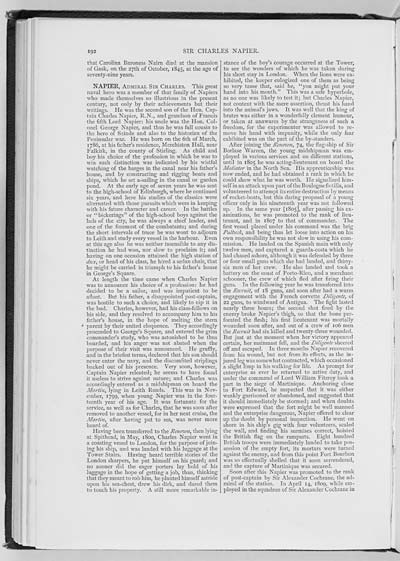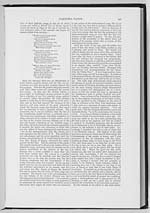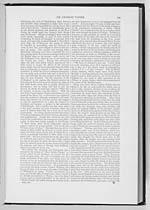192
that Carolina Baroness Nairn died at the mansion
of Gask, on the 27th of October, 1845, at the age of
seventy-nine years.
NAPIER, ADMIRAL SIR CHARLES. This great
naval hero was a member of that family of Napiers
who made themselves so illustrious in the present
century, not only by their achievements but their
writings. He was the second son of the Hon. Cap-
tain Charles Napier, R.N., and grandson of Francis
the fifth Lord Napier: his uncle was the Hon. Col-
onel George Napier, and thus he was full cousin to
the hero of Scinde and also to the historian of the
Peninsular war. He was born on the 6th of March,
1786, at his father's residence, Merchiston Hall, near
Falkirk, in the county of Stirling. As child and
boy his choice of the profession in which he was to
win such distinction was indicated by his wistful
watching of the barges in the canal near his father's
house, and by constructing and rigging boats and
ships, which he set a-sailing in the canal or garden
pond. At the early age of seven years he was sent
to the high-school of Edinburgh, where he continued
six years, and here his studies of the classics were
alternated with those pursuits which were in keeping
with his future character and career. In the battles
or "bickerings" of the high-school boys against the
lads of the city, he was always a chief leader, and
one of the foremost of the combatants; and during
the short intervals of trace he was wont to adjourn
to Leith and study every vessel in the harbour. Even
at this age also he was neither insensible to any dis-
tinction he had won, nor slow to proclaim it; and
having on one occasion attained the high station of
dux, or head of his class, he hired a sedan chair, that
he might be carried in triumph to his father's house
in George's Square.
At length the time came when Charles Napier
was to announce his choice of a profession: he had
decided to be a sailor, and was impatient to be
afloat. But his father, a disappointed post-captain,
was hostile to such a choice, and likely to nip it in
the bud. Charles, however, had his class-fellows on
his side, and they resolved to accompany him to his
father's house, in the hope of melting the stern
parent by their united eloquence. They accordingly
proceeded to George's Square, and entered the grim
commander's study, who was astonished to be thus
boarded, and his anger was not abated when the
purpose of their visit was announced. He gruffly,
and in the briefest terms, declared that his son should
never enter the navy, and the discomfited striplings
backed out of his presence. Very soon, however,
Captain Napier relented; he seems to have found
it useless to strive against nature; and Charles was
accordingly entered as a midshipman on board the
Martin, lying in Leith Roads. This was in Nov-
ember, 1799, when young Napier was in the four-
teenth year of his age. It was fortunate for the
service, as well as for Charles, that he was soon after
removed to another vessel, for in her next cruise, the
Martin, after having put to sea, was never more
heard of.
Having been transferred to the Renown, then lying
at S pithead, in May, 1800, Charles Napier went in
a coasting vessel to London, for the purpose of join-
ing his ship, and was landed with his luggage at the
Tower Stairs. Having heard terrible stories of the
London sharpers, he put himself on his guard; and
no sooner did the eager porters lay hold of his
luggage in the hope of getting a job, than, thinking
that they meant to rob him, he planted himself astride
upon his sea-chest, drew his dirk, and dared them
to touch his property. A still more remarkable in-
stance of the boy's courage occurred at the Tower,
to see the wonders of which he was taken during
his short stay in London. When the lions were ex-
hibited, the keeper eulogized one of them as being
so very tame that, said he, "you might put your
hand into his mouth." This was a safe hypeibole,
as no one was likely to test it; but Charles Napier,
not content with the mere assertion, thrust his hand
into the animal's jaws. It was well that the king of
brutes was either in a wonderfully clement humour,
or taken at unawares by the strangeness of such a
freedom, for the experimenter was allowed to re-
move his hand with impunity, while the only fear
exhibited was on the part of the by-standers.
After joining the Renown, 74, the flag-ship of Sir
Borlase Warren, the young midshipman was em-
ployed in various services and on different stations,
until in 1805 he was acting-lieutenant on board the
Mediator in the North Sea. His apprenticeship was
now ended, and he had obtained a rank in which he
could show what he was worth. He signalized him-
self in an attack upon part of the Boulogne flotilla, and
volunteered to attempt its entire destruction by means
of rocket-boats, but this daring proposal of a young
officer only in his nineteenth year was not followed
up. In the same year [1805], after passing his ex-
aminations, he was promoted to the rank of lieu-
tenant, and in 1807 to that of commander. The
first vessel placed under his command was the brig
Pultusk, and being thus let loose into action on his
own responsibility he was not slow in using his com-
mission. He landed on the Spanish main with only
twelve men, and captured a guarda-costa which he
had chased ashore, although it was defended by three
or four small guns which she had landed, and thirty-
six men of her crew. He also landed and took a
battery on the coast of Porto-Rico, and a merchant
schooner, the crew of which fled after firing their
guns. In the following year he was transferred into
the Recruit, of 18 guns, and soon after had a warm
engagement with the French corvette Diligente, of
22 guns, to windward of Antigua. The fight lasted
nearly three hours; the second shot fired by the
enemy broke Napier's thigh, so that the bone per-
forated the flesh; his first lieutenant was mortally
wounded soon after, and out of a crew of 106 men
the Recruit had six killed and twenty-three wounded.
But just at the moment when her victory appeared
certain, her mainmast fell, and the Diligente sheered
off and escaped. In three months Napier recovered
from his wound, but not from its effects, as the in-
jured leg was somewhat contracted, which occasioned
a slight limp in his walking for life. As prompt for
enterprise as ever he returned to active duty, and
under the command of Lord William Fitzroy took a
part in the siege of Martinique. Anchoring close
to Fort Edward, he suspected that it was either
weakly garrisoned or abandoned, and suggested that
it should immediately be stormed; and when doubts
were expressed that the fort might be well manned
and the enterprise dangerous, Napier offered to clear
up the doubt by personal inspection. He went on
shore in his ship's gig with four volunteers, scaled
the wall, and finding his surmises correct, hoisted
the British flag on the ramparts. Eight hundred
British troops were immediately landed to take pos-
session of the empty fort, its mortars were turned
against the enemy, and from this point Fort Bourbon
was so effectually shelled that it soon surrendered,
and the capture of Martinique was secured.
Soon after this Napier was promoted to the rank
of post-captain by Sir Alexander Cochrane, the ad-
miral of the station. In April 14, 1809, while em-
ployed in the squadron of Sir Alexander Cochrane in

![]() Universal Viewer |
Universal Viewer | ![]() Mirador |
Large image | Transcription
Mirador |
Large image | Transcription
![]()

